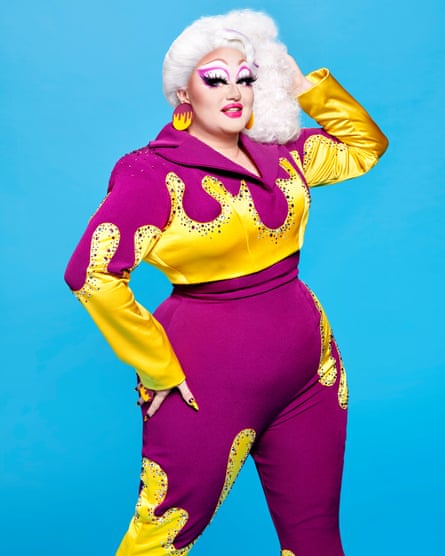In recent years, RuPaul’s Drag Race has become a mainstay of international TV, with outposts from Spain and Australia to Thailand and Canada. The UK version debuted at the end of 2019 to much acclaim, with two more series filmed in London and Manchester following in quick succession. The third – currently airing on BBC Three – has seen a number of twists on the format, however, with shock eliminations and surprise saves, and lip-syncs used to separate both the top and the bottom of the pile. It’s the closest the UK series has felt to its US counterpart, but in doing so it risks losing the subversive, cheeky charm that made it so irresistible.
In fact, the first two series of Drag Race UK were worlds away from the heavily produced and polished US series. Embracing the camp irreverence of its queens, it allowed them to shine on their own terms, relishing their rough edges and quintessentially British pop culture references (think EastEnders, Gemma Collins and, er, Margaret Thatcher). Breathing new life into Drag Race, it struck the balance between revering and ridiculing the franchise. It also celebrated queer people and shared their stories in a way that many shows struggle to do, with British drag celebrated on the global stage.
Drama happened organically, via an iconic sparring match between Divina De Campo and The Vivienne (“A red wig and a silver dress? I don’t think”) in series one, and Ginny Lemon’s self-elimination in the second run. Filming for the second series was interrupted by the pandemic, which only raised the stakes and made for intense, emotional viewing. This year, however, the drama hasn’t been left to chance, with producer-made twists in almost every episode leading some viewers to switch off.
The changes haven’t just been in front of the camera but also behind it, with some episodes rumoured to have been filmed in just one day (typically they would be made over two). While it may prove logistically easier, this alleged filming schedule has its flaws, not least in giving the queens less time to prepare – and to shine.

A lack of time has been a consistent theme across the series, not least in episode seven, an adaptation of the show’s classic “ball” challenge where contestants must present three themed outfits on the runway. Expectations were sky-high, with previous ball challenges having birthed incredible looks such as Divina De Campo’s legendary laundry bag pantsuit and A’Whora’s breathtaking superhero Covid Nine-Tina (constructed entirely from blue bin bags).
This year’s challenge took place against the clock, meaning contestants had just one hour to create and change into each outfit. It was a clever twist on a classic, but Drag Race UK didn’t stop there, throwing in an additional celebrity guest to bark catchphrases at the harangued queens, who had precious little time to create a look from scratch. All this, while also asking them to talk about their childhood traumas. Neither the queens nor the viewers knew whether to laugh or cry.
The judges’ opinions of the cast has also seemed less important this year than delivering shocking results. Despite almost exclusively positive feedback from the judges for Kitty Scott-Claus and River Medway following the “Drag-Lexa” challenge in episode five, RuPaul revealed that there would be no winners that week and that all queens were at risk of elimination.
Episode six saw yet another controversial decision, with the double elimination of fan favourites River Medway and Choriza May. While River had been criticised by the judges in the main challenge, Choriza had been largely praised. The lip sync didn’t seem to justify both queens being sent home – with RuPaul’s decision feeling unnecessarily harsh (and necessitating a double save later in the series to balance the numbers).

Indeed, the best moments in this series have been the ones that have felt authentic and joyous, such as the lip sync between Vanity Milan and Scarlett Harlett (dressed as Bianca from EastEnders, because, of course). Their performance of Mis-Teeq’s Scandalous, which set social media ablaze for all the right reasons, was Drag Race UK – and Drag Race full stop – at its best. The talent of the queens shone bright, with Mis-Teeq singer and guest judge Alesha Dixon screaming, cheering and harmonising as the queens stomped, span and dropped into the splits.
We also witnessed the long-awaited inclusion of the first cisgender female queen, Victoria Scone, with the UK series breaking ground for the franchise as a whole. Moving conversations between queens have also highlighted important issues such as representation, body image, toxic masculinity and living with HIV, with the support they have offered one another acting as an antidote to aggression both within and against the queer community.
Even so, the producer meddling has felt overt, and unnecessary. The success of Drag Race UK’s first two series shows that the format works well in its simplest form, and there was no need to fix what wasn’t broken. Clearly, though, viewers are willing to stick with it; before series three has even ended, anticipation is already building for the upcoming fourth outing. Let’s hope it’s given a little more breathing space next time around, to be as brash and brilliant as it can be.
The finale of Drag Race UK series three is on BBC Three and BBC iPlayer on 25 November at 7pm

Comments (…)
Sign in or create your Guardian account to join the discussion